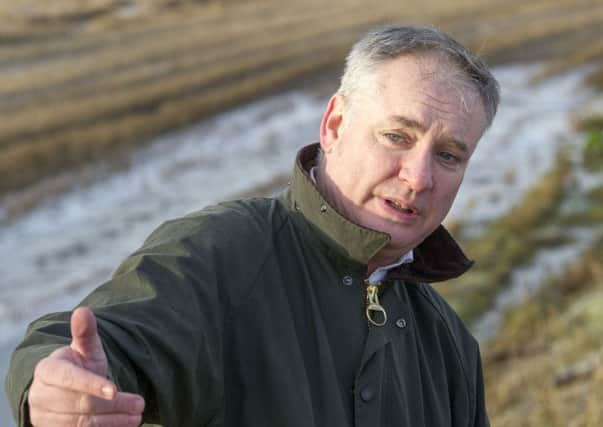Lochhead faces threshing over late payment fiasco


This year, this means that more than half of them will still be waiting for their Basic Payment Scheme cash when Scottish Government minister Richard Lochhead addresses them.
If the union delegates are representative of the industry, the delay in payment will mean that a quarter will have visited their banker to negotiate overdraft extensions.
Advertisement
Hide AdAdvertisement
Hide AdIt is therefore very easy to predict that the minister is likely to receive either a rather cool or a very hot reception on what looks extremely likely to be his last official visit to the AGM.
The late payment issue has been aggravated both by promises made and now broken on payment dates and by the cost of the new computer which has been programmed to deal with the payments. So far, this magical box of tricks has cost about £180 million or around £10,000 for each and every farmer.
The split between Lochhead and the industry is wider now than it has ever been in his nine year tenure but it is not based solely on the delay in subsidy payments.
The minister is not to blame for poor commodity prices but his name is firmly in the frame for difficulties arising from complex environmental policies that come under the heading of greening.
He is not to blame for natural disasters such as flooding but his government are firmly behind radical changes to land ownership that are not being thoroughly debated in a rush to legislative completion before the end of next month.
Over the years, the minister has been adept at blaming either Westminster or Brussels – and sometimes both – whenever he finds himself in a hole.
But those escape routes are not relevant to the above problems. They lie at his door.
The farming industry is in a trough and often during such times, revolutionary whispers can be heard from the ranks but not one of the top NFUS team has come under challenge. This either means the foot soldiers are happy with the efforts of their officebearers or that no one fancies he or she could do better in the present climate.
Advertisement
Hide AdAdvertisement
Hide AdIn contrast with the situation in Scotland where the politicians are under fire and union leaders are unchallenged, the English NFU annual meeting, which will be held in ten days’ time, will see their top office holders challenged while their politicians look to have a relatively free ride.
UK Defra minister Liz Truss will likely have an easier time at the English meeting as her department has managed to get 90 per cent of the Basic Payment scheme money out to farmers.
Among the list of possible changes in the English union hierarchy, there is the prospect of the first female president being elected in its 100-plus year history. Since she announced her bid to unseat current incumbent Meurig Raymond, too much has been made of Minette Batters’ gender and not enough has been made of her agenda.
This self-made businesswoman has pointed out that too much attention has been paid to Defra –the UK ministry in charge of rural affairs and farming could gain much more from concentrating on those government departments dealing with health and education.
This seems a smart move with the Defra budget being decimated under Liz Truss while both education and health budgets have been protected. By using the argument of healthy home-produced food, Batters wants the union to home in on those new targets.
Another item on her agenda is her view that the various UK farming unions should work together more than they do. Thanks to a combination of devolution and personality clashes, there has been a drift apart north and south of the border in the past 20 years.
The problem for both Scottish politicians and farming leaders is that all their energy and commitment is going into fighting today’s battles leaving little or no time to look into the future.